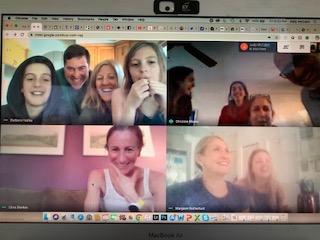
Courtesy of Margaret Rutherfurd
Margaret Rutherfurd wakes up in her East Harlem, New York City, apartment at five or six in the morning to sanitize light switches and handles, wash towels and clean up dishes from the night before. Immunocompromised and severely asthmatic, exposure to the novel coronavirus is particularly threatening for Rutherfurd and her daughter, Catherine, a sophomore at Yale College.
Still, the New Yorker’s personal health is only one of many affairs that nags at her mind. Like many, her life has been complicated from multiple angles.
Almost 1,300 miles away, Rutherfurd’s father resides in Miami Beach, Florida, with congestive heart failure, diabetes and emphysema — a progressive lung disease that necessitates oxygen supplementation. Rutherfurd is his sole caretaker. With the window of opportunity to visit him closed, Rutherfurd knows she must rely on her father’s health care system and remains apprehensive and worried.
“It’s a very powerless feeling,” she said. “I’m ready to feel terrible if he dies, but I think he is among this sort of vulnerable population that is probably not going to have a great outcome.”
On March 9, Rutherfurd, who works as an attorney for a French bank, received a phone call from her supervisor. As the situation in New York City was gearing up to take a turn for the worse, her supervisor delivered a personal blow to Rutherfurd and asked her to take administrative leave from her job. She remains unsure of the implications.
“It’s been this really quite frankly awful thing,” Rutherfurd said. “You’re already isolated because you’re working from home, and you’re already worried that the world’s going to end. So, [my work situation] just puts the cherry on top of the sundae … It’s just one big question mark.”
Living in the epicenter of the COVID-19 outbreak is dangerous and overwhelming, even without underlying health or job security concerns, Rutherfurd and her daughter noted. When Catherine ventures into public spaces to go grocery shopping, she encounters many people in East Harlem who appear to lack a sense of personal space or awareness of safety precautions.
Though Rutherfurd leaves the house far less often than Catherine, Rutherfurd said she also notices general irresponsibility, such as not wearing masks or being as careful as she believes the public should be. She senses that the message to take these extra precautions either “isn’t getting out or it’s getting out in a way that there’s some confusion.”
Rutherfurd has also noticed a shift in some people’s behavior toward others, citing a skirmish that she got into with the owner of a local liquor store last week over an item that would not scan.
“[The owner] was testy with me, and did he seem on edge because of everything that’s been going on,” Rutherfurd said. “He was obviously stressed out over something else. I think people are acting on edge. He’s never been that way ever before.”
While the mother and daughter pair are currently sheltering in place, if one of them gets sick, they will drive to Connecticut since the New York hospitals are “overcrowded” and look “horrible,” Rutherfurd said. She has a bag packed ready to go.
Though her father, work, daughter and health of family and friends occupy the majority of her thoughts, Rutherfurd finds solace in speaking more often with her four sisters, nieces and nephews as a result of the pandemic. Catherine is also grateful that they have somewhere to call home.
“There are a lot of people on the street, I’d say,” Catherine said. “Fewer than before, but there are homeless people and people with drug problems, so they don’t really have anywhere to go. It’s definitely upsetting. There’s a global crisis, and they can’t go anywhere.”


Rutherfurd, who lived in New Haven until Catherine was 4 years old, has also figured out a way to promote positivity through supporting Connecticut and the Elm City, communities she feels closely tied to from afar. Rutherfurd will be “concentrating [her] legal background into ways [she] can help CT residents” now and even after she returns to “life as usual.”
Uncertainty, however, remains.
“It’s not easy being in an apartment in the epicenter of the virus,” Catherine said. “It’s very scary outside. I still feel like it’s early in this whole thing, and I honestly don’t know how things are going to change. I know my mom is stressed about her job, and that’s scary. And if she gets it, she’s going to be really sick.”
Margaret Hedeman | margaret.hedeman@yale.edu
This story is part of a larger series profiling Yale and New Haven community members during the COVID-19 pandemic. To read more, click here.







